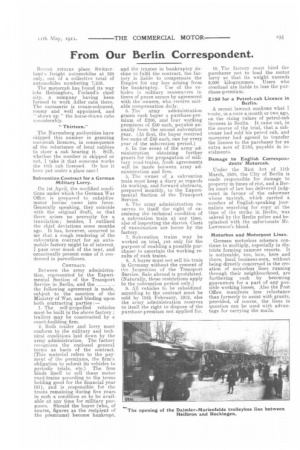From Our Berlin Correspondent.
Page 7

If you've noticed an error in this article please click here to report it so we can fix it.
Recent returns place Switzerland's freight automobiles at 326 only, out of a collective total of automobiles numbering 7,249.
The motorcab has found its way kit° Helsingfors, Finland's chief city, a company having been formed to work Adler cabs there. The carosserie is cream-coloured, roomy and well appointed, and " shows up " the horse-drawn cabs con siderably.
"Thirteen."
The Nuremberg authorities have skipped this number in granting motorca.b licences, in consequence of the reluctance of local cabbies to steer a cab bearing it. Still, whether the number is skipped or not, I take it that someone works the 13th cab licensed. Or has it been put. under a glass case?
Subvention Contract for a German Military Lorry.
On 1st April, the modified conditions under which the German War Office is prepared to subsidize motor lorries came into force. Generally speaking, they coincide with the original draft, so that there arises no necessity for a translation ; besides, I outlined the chief deviations some months ago. It has, however, occurred to me that a rough rendering of the subvention contract for an automobile factory might be of interest. I pass over much of the text, and occasionally present some of it condensed in parentheses,
CONTRACT.
Between the army administration, represented by the Experimental Section of the Transport Service in Berlin, and the the following agreement is made, subject to the sanction of the Ministry of War, and binding upon both contracting parties :— 1. The self-propelled vehicles must. be built in the above factory ; trailers may be constructed by a coach-building firm.
2. Both trailer and lorry must conform to the military and technical conditions laid down by the army administration, The factory recognizes the enclosed general terms as basis of the contract. (This material refers to the payment of the premiums, the firm's obligation to submit its vehicles to periodic trials, etc.) The firm binds itself to sell these motor road-trains according to the terms holding good for the financial year 1911, and is responsible for the trains remaining during five years in such a condition as to be available at any time for military purposes. Should the buyer (who, of course, figures as the recipient of the premiums) become bankrupt, and the trustee in bankruptcy decline to fulfil the contract, the factory is liable to compensate the Empire for any loss arising from the bankruptcy. Use of the vehicles in military manoeuvres in times of peace occurs by agreement with the owners, who receive suitable compensation daily.. 3. The army administration grants each buyer a purchase-premium of 2200, and four working premiums of £50 each, payable annually from the second subvention year. (At first, the buyer received five sums of 250 each, one for every year of the subvention period.)
4. In the event of the army administration obtaining further grants for the propagation of military road-trains, fresh agreements will be made between army administration and firm.
5. The owner of a subvention train must keep a diary as regards its working, and forward abstracts, prepared monthly, to the Experimental Section of the Transport Service.
6. The army administration reserves to itself the right of examining the technical condition of a subvention train at any time, also of inspecting the diaries. Costs of examination are borne by the factory.
7. Subvention trains may be worked on trial, yet only for the purpose of enabling a possible purchaser to ascertain the working results of such trains.
8. A buyer must not sell his train in Germany without the consent of the Inspection of the Transport Service. Sale abroad is prohibited. (Naturally, these restrictions apply to the subvention period only.) 9. All vehicles to be subsidized according to the contract must be sold by 15th February, 1912, else the army administration reserves to itself the right to dispose of the purchase-premium not applied for. 10. The factory must bind the purchaser not to load the motor lorry so that its weight exceeds 9,000 kilogrammes. Users who overload are liable to lose the purchase-premium.
£150 for a Petrol-cab Licence in Berlin.
A recent lawsuit confirms what I wrote, in a note a month or two ago, on the rising values of petrol-cab licences in Berlin. It came out, in the course of the trial, that a cabowner had sold his petrol cab, and moreover had agreed to transfer the licence to the purchaser for an extra sum of .2150, payable in instalments.
Damage to English Correspondents' Niotorcab.
Under the Riot Act of 11th March, 1850, the City of Berlin is made responsible for damage to property in times of riot, and a Berlin court of law has delivered judgment in favour of the cabowner whose taxicab, which carried a number of English-speaking journalists searching for copy at the time of the strike in Berlin, was sabred by the Berlin police and besplashed with the unfortunate Mr. Lawrence's blood.
Motorbus and Motorpost Lines.
German motorbus schemes continue to multiply, especially in districts forming summer resorts. It is noticeable, too, how, here and there, local business-men, without being directly concerned in the creation of motorbus lines running through their neighbourhood, are furthering such by becoming guarantors for a part of any possible working losses. Also the Post Office manifests less reluctance than formerly to assist with grants, provided, of course, the lines in question can be used with advantage for carrying the mails.




















